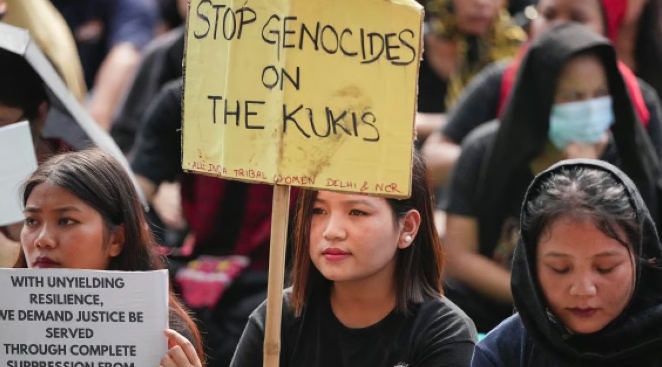Walk the talk (GS Paper 2, Society)

Introduction
- Manipur, a state in Northeast India, has recently been plagued by unrest and violent protests, marking the first significant direct clashes between the Kuki-Zomi tribals and the Meiteis in three decades.
- The ongoing turmoil poses severe challenges to regional security, with potential repercussions that could destabilize the fragile peace and influence the broader geopolitical landscape of the region.
Underlying Causes of Unrest in Manipur
External Factors:
- Myanmar Crisis: The military coup in Myanmar in 2021 triggered unrest that led to a steady influx of Burmese refugees into Manipur, many of whom share ethnic ties with the Kuki tribe. This has complicated the ethnic balance in the state.
- Cross-Border Crime and Drug Trafficking: Manipur’s proximity to the Golden Triangle and its porous borders make it susceptible to drug trafficking and other cross-border criminal activities, exacerbating the region’s instability.
Internal Factors:
- Demand for Scheduled Tribe Status: A recent directive by the Manipur High Court to recommend the Meiteis for Scheduled Tribe status has sparked protests from tribal groups, who fear losing their reservation benefits.
- Land Disputes: The Meitei community, which primarily resides in the densely populated Imphal Valley, occupies only about a tenth of the state’s land. This uneven distribution has intensified competition for land and resources between the Meiteis and hill tribes.
- Historical Tensions: Long-standing conflicts between hill tribes and the Meiteis over political representation, resources, and cultural recognition have fueled the current unrest.
- Economic Disparity: The region’s economic underdevelopment has heightened inter-ethnic tensions as communities vie for limited resources and opportunities.
- Governance Issues: The government's response, including the suspension of mobile internet and the application of the Armed Forces (Special Powers) Act (AFSPA), has not effectively addressed the root causes of the unrest and has sometimes aggravated the situation.
Consequences of the Unrest
- Rise in Cross-Border Criminal Activities: The ongoing unrest could lead to increased smuggling, drug trafficking, and illegal arms trading.
- Expansion of Militant Influence: Prolonged instability might provide an opportunity for militant groups to gain influence and recruit more members, exacerbating extremist activities.
- Strained International Relations: The unrest could impact India’s relations with neighboring countries like Myanmar, Bangladesh, and China, complicating diplomatic efforts in the region.
- Economic Setbacks: Continuous unrest could deter investment and impede economic development, leading to higher unemployment and poverty, which could further fuel instability.
- Impact on India’s Act East Policy: The instability could hamper India’s efforts to strengthen economic and strategic ties with Southeast Asia through its Act East Policy.
- Human Rights Concerns: Prolonged unrest could lead to human rights violations, drawing international criticism and potentially damaging India’s reputation as an advocate for human rights and democracy.
Government Initiatives
- Engaging in Political Dialogue: The government has initiated discussions with various ethnic groups to address grievances and build trust for lasting peace.
- Withdrawal from Suspension of Operations (SoO): The Manipur government has withdrawn from the SoO arrangement with certain militant groups amid allegations of instigating unrest among forest encroachers.
- Development Programs: Efforts to improve infrastructure, education, and healthcare in Manipur include:
- The Northeast Special Infrastructure Development Scheme (NESIDS)
- The India-Myanmar-Thailand Trilateral Highway project
- Collaborations with the National Skill Development Corporation (NSDC) for youth training and employment
- Anti-Drug Trafficking Efforts: The government has intensified efforts to combat drug trafficking, including destroying illegal poppy plantations to reduce criminal influence and enhance security.
Proposed Measures for Improvement
- Inclusive Dialogue: Engage all ethnic groups and stakeholders in meaningful dialogue to address their concerns and foster mutual understanding.
- Strengthening Governance: Address corruption and inefficiency, and bolster local administration to improve governance.
- Economic Investment: Focus on developing infrastructure, education, and job creation to reduce poverty and economic disparities.
- Reviewing AFSPA: Consider alternative security measures that protect human rights while maintaining law and order.
- International Cooperation: Work closely with neighboring countries, especially Myanmar, to manage cross-border issues such as smuggling, infiltration, and the refugee crisis.
Conclusion
- To achieve lasting peace and progress in Manipur, it is essential to prioritize dialogue, economic empowerment, good governance, security, cultural harmony, and international cooperation.
- Addressing the multifaceted challenges of the region requires a concerted effort from both the government and local communities, paving the way for a stable and prosperous future.


